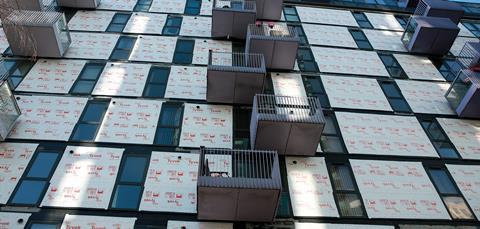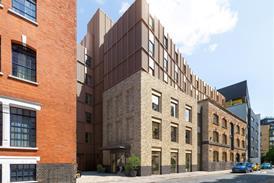’Responsible actors’ scheme could put developers out of business if they do not pay to sort cladding problems
Housing secretary Greg Clark has brought into force new laws which could see housebuilders banned from obtaining planning or building control approval if they fail to adhere to government exhortations to fix historic cladding defects.

In what could be one of his last significant acts before a likely reshuffle under the new prime minister next week, Clark said that he had laid “commencement regulations” bringing into force powers under the Building Safety Act for a so-called “responsible actors” scheme.
Under the proposed responsible actors scheme, described in section 126-129 of the Building Safety Act, eligible housebuilders will have to meet criteria – such as remedying building safety defects in existing buildings and making requested financial contributions – to ensure they remain members of the scheme.
Those who are not deemed “responsible actors” can be prevented by a future secretary of state from receiving planning permission, building out existing permissions, or securing building control approval.
However, the Department for Levelling Housing and Communities has not yet published the detailed regulations describing the actual working of the scheme which would be required to get the system up and running, meaning that it is not yet live, even though the commencement regulations have been laid.

Clark said: “Developers must make buildings they are responsible for safe without delay and today’s commencement regulations bring us a step closer to this.
“Our proposed scheme will help identify the few developers who are refusing to pull their weight to help fix the cladding crisis.”
>> See also: Full list of developers to have signed the cladding pledge
>> See also: Gove’s cladding deal: What does it mean for the sector?
“In the meantime, developers must sign the final contracts, which commit them to fix unsafe buildings they are responsible for.”
The commencement regulations brought section 126-129 of the Building Safety Act into legal force from September 1. Asked whether this meant the “responsible actors” scheme was now live, a spokesperson for the DLUHC said: “These are commencement regulations, so this is the first step in the legislative process. There will be more information available in due course.”
Earlier in the year, under previous housing secretary Michael Gove, the department asked the UK’s biggest developers to sign a pledge to fix all historic buildings with building safety defects, without recourse to public funds, going back 30 years.
It is understood the department went out to 53 developers, but as of today there are only 49 firms listed by the DLUHC as having signed up to the pledge.
The department is currently understood to be in discussions with housebuilders over the detail of the legal contracts sitting behind the pledge, with housebuilders believing the documentation does not reflect the heads of terms pledge that they signed earlier in the year.
The pledge itself triggered accounts provisions by major housebuilders of more than £2bn, given the extent of work expected to be required.
Meanwhile, the government is also seeking the views of renters, landlords, councils and housing groups on new housing standards proposed for the private rented sector.
On Friday, the Department for Levelling Up, Housing and Communities launched a consultation on the Decent Homes Standard, which already applies to the social housing sector, and would legally bind private landlords to ensure properties meet a set standard.
More than a fifth of 4.4m privately rented homes in England are in poor condition according to the government, which aims to halve the number of poor-quality rental homes by the end of the decade.
The consultation asks whether new standards – which could cover the state of domestic facilities and the presence of serious hazards like major damp or fire risks – should be introduced and how they should be enforced.
Under the proposals the standards would cover the nascent build to rent sector. However most build to rent landlords would expect new build properties to exceed whatever standards are ultimately set.
















1 Readers' comment